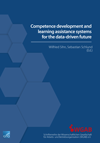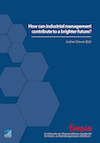Search


Bibtex
Cite as text
@Article{,
Year= "2021",
Volume= "Schriftenreihe der Wissenschaftlichen Gesellschaft für Arbeits- und Betriebsorganisation (WGAB) e.V.",
Pages= "161-178",
Journal = "WGAB",
Title= "Collaborative Approaches for Self-Organized Competence Development ",
Author= "Dr.-Ing. Heiko Matheis
Center for Management Research
German Institutes of Textile and Fiber Research Denkendorf
Jennifer Lucke M.Sc.
Institute for Diversity Studies in Engineering (IDS)
University of Stuttgart
Prof. Dr. rer. pol. Dipl.-Ing. Meike Tilebein
Institute for Diversity Studies in Engineering (IDS) University of Stuttgart
Center for Management Research
German Institutes of Textile and Fiber Research Denkendorf
",
Doi= "https://doi.org/10.30844/wgab_2021_10",
Abstract= "The ongoing digital transformation is changing work processes and production environments. Particularly small and medium-sized enterprises (SMEs) in the European textile industry are confronted with numerous related challenges. Among these, demand-oriented development and efficient use of employee competences are becoming ever more important for success. New decentralized and situationally adaptable solutions that enable self-organized learning paths and informal competency development are becoming a necessity for the participants in production processes to acquire the essential competences. Approaches to support self-organized learning paths and dynamic, role- and actor-based models for collaborative knowledge generation already exist and have proven especially worthwhile in the SME environment of the textile industry and its innovation processes.
This paper presents challenges of collaborative competence development and approaches to solve them on different levels of the organization. In addition, it explains specific implementations based on project examples from the textile industry and outlines needs for further research.
",
}
Dr.-Ing. Heiko Matheis
Center for Management Research
German Institutes of Textile and Fiber Research Denkendorf
Jennifer Lucke M.Sc.
Institute for Diversity Studies in Engineering (IDS)
University of Stuttgart
Prof. Dr. rer. pol. Dipl.-Ing. Meike Tilebein
Institute for Diversity Studies in Engineering (IDS) University of Stuttgart
Center for Management Research
German Institutes of Textile and Fiber Research Denkendorf(2021): Collaborative Approaches for Self-Organized Competence Development . Schriftenreihe der Wissenschaftlichen Gesellschaft für Arbeits- und Betriebsorganisation (WGAB) e.V.(2021), S. 161-178. Online: https://doi.org/10.30844/wgab_2021_10 (Abgerufen 23.02.26)
Open Access
Abstract
Abstract
The ongoing digital transformation is changing work processes and production environments. Particularly small and medium-sized enterprises (SMEs) in the European textile industry are confronted with numerous related challenges. Among these, demand-oriented development and efficient use of employee competences are becoming ever more important for success. New decentralized and situationally adaptable solutions that enable self-organized learning paths and informal competency development are becoming a necessity for the participants in production processes to acquire the essential competences. Approaches to support self-organized learning paths and dynamic, role- and actor-based models for collaborative knowledge generation already exist and have proven especially worthwhile in the SME environment of the textile industry and its innovation processes. This paper presents challenges of collaborative competence development and approaches to solve them on different levels of the organization. In addition, it explains specific implementations based on project examples from the textile industry and outlines needs for further research.
Keywords
Schlüsselwörter
References
Referenzen
.

 Deutsch
Deutsch
